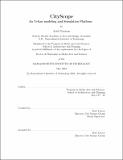| dc.description.abstract | Current mass-urbanization trends create vast opportunities alongside new challenges to cities worldwide. Immigration, climate change, technological disruptions, inequality, and health concerns, are only some of the questions urban decision-makers are facing today. As these challenges grow, traditional urban processes are rendered insufficient, as they trail behind rapidly expanding cities and technological disruptions.
In this dissertation I investigate a new urban process, which couples data-driven and evidence- based decision-making, with human-centric and participatory planning. I explore this new urban process through the design, development and deployment of CityScope: an urban modeling, simulation, and decision-making platform. From collaborative allocation of refugee-housing in Germany, through crowd-sourced mapping of public safety in Guadalajara, to mass-transit co-creation in Boston, CityScope helps to build agency amongst the ‘have-nots’, who traditionally were denied from the urban process.
I report on a series of lab experiments and real-world deployments of CityScope through four themes: Insight: CityScope as an urban observatory, using real-time spatial data and urban dynamics analytics; Transformation: CityScope as an iterative, collaborative, and real-time Urban Human Computer Interaction system; Prediction: CityScope for urban forecasting and simulation of implicit aspects in the built environment; and Consensus: CityScope for collaborative decision-making with diverse stakeholders and communities. Finally, I describe how CityScope supported, enhanced, and occasionally replaced traditional urban decision-making, affecting both the urban process as well as its outcomes. | |
